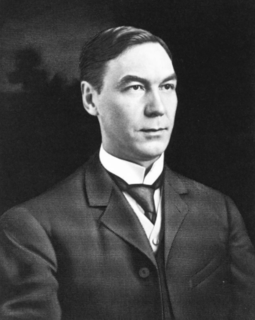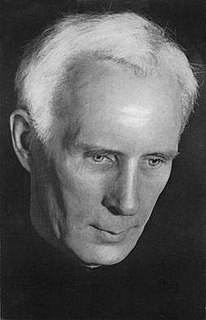A Quote by Dwight L. Moody
When a man has no strength, if he leans on God, he becomes powerful.
Related Quotes
When we accept Christ we enter into three new relationships: (1) We enter into a new relationship with God. The judge becomes the father; the distant becomes the near; strangeness becomes intimacy and fear becomes love. (2) We enter into a new relationship with our fellow men. Hatred becomes love; selfishness becomes service; and bitterness becomes forgiveness. (3) We enter into a new relationship with ourselves. Weakness becomes strength; frustration becomes achievement; and tension becomes peace.
The glory of God is the living man, but the life of man is the vision of God', says St. Irenaeus, getting to the heart of what happens when man meets God on the mountain in the wilderness. Ultimately, it is the very life of man, man himself as living righteously, that is the true worship of God, but life only becomes real life when it receives its form from looking toward God.
A knowledge of our ability to consciously radiate health, strength, and harmony will bring us into a realization that there is nothing to fear because we are in touch with Infinite Strength. This knowledge can be gained only by making a practical application of this information. We learn by doing-through practice the athlete becomes powerful.
When an old man and a young man work together, it can make an ugly sight or a pretty one, depending on who's in charge. If the young man's in charge or won't let the old man take over, the young man's brute strength becomes destructive and inefficient, and the old man's intelligence, out of frustration, grows cruel and inefficient. Sometimes the old man forgets that he is old and tries to compete with the young man's strength, and then it's a sad sight. Or the young man forgets that he is young and argues with the old man about how to do the work, and that's a sad sight, too.
Feuerbach ... recognizes ... "even love, in itself the truest, most inward sentiment, becomes an obscure, illusory one through religiousness, since religious love loves man only for God's sake, therefore loves man only apparently, but in truth God only." Is this different with moral love? Does it love the man, this man for this man's sake, or for morality's sake, for Man's sake, and so-for homo homini Deus-for God's sake?
He had said, "I am a man," and that meant certain things to Juana. It meant that he was half insane and half god. It meant that Kino would drive his strength against a mountain and plunge his strength against the sea. Juana, in her woman's soul, knew that the mountain would stand while the man broke himself; that the sea would surge while the man drowned in it. And yet it was this thing that made him a man, half insane and half god, and Juana had need of a man; she could not live without a man.
GraceQuest is a gripping story of one man's (and his family's) struggle with tremendous weakness and pain, but it is also a narrative theodicy--defense of God's goodness in spite of the undeniable reality of evil. . . . This is an honest and hard-hitting book about God's grace in and through tremendous loss of health and strength. Readers will find hope and help here if they are open to its message about the God-given 'strength to suffer well.'




































